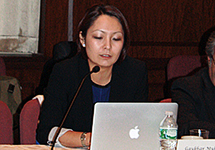November 3, 2014
About the Event
In May 2015, 191 governments, relevant international agencies, and scores of civil society organizations will convene at the United Nations in New York to review and assess, for the eighth time, the implementation of the Treaty on the Non-Proliferation of Nuclear Weapons (NPT). Against a backdrop of limited compliance, unfulfilled obligations, and rising insecurity in Eastern Europe, the Middle East, and elsewhere— and the ensuing deterioration of interstate relationships—NPT state parties are tasked with sustaining and strengthening the treaty regarded as the “cornerstone” of world security.
Therefore, with only a few months before the start of the 2015 NPT Review Conference (RevCon), the James Martin Center for Nonproliferation Studies co-hosted, with the Permanent Mission of Indonesia to the United Nations, an informal roundtable discussion on the sidelines of the UN First Committee session. Diplomats from twenty countries convened to discuss the current “state of play” regarding the most influential issues facing the RevCon, identify goals and expectations, and explore ways to mitigate potentially divisive issues facing the state parties.
2015 NPT Review Conference Discussions
Participants in the informal discussion represented key regional and political groupings—including the Non-Aligned Movement, the New Agenda Coalition, the Non-Proliferation and Disarmament Initiative, as well as four nuclear weapon states. They deliberated ways in which the 2010 Action Plan has or has not been implemented, and how to advance the agenda in 2015.
Participants were also encouraged to consider how other key, as-yet-undetermined outcomes—such as the negotiations on Iran’s nuclear program, the Vienna conference on humanitarian impact of nuclear weapons, as well as a possible Helsinki conference on a Middle East Weapons-of-Mass-Destruction-Free Zone—will affect the RevCon.
As moderator of the discussion, CNS Director Dr. William Potter urged diplomats to use all the precious time available to them to obtain interagency agreement on these vital issues, including important, yet relatively noncontroversial issues such as disarmament and nonproliferation education. He also implored representatives from the different regional and political groupings to be less hasty in dismissing the proposals broached by others simply because of their attribution.
An Important Year of Historic Anniversaries
One participant noted that the 2015 Review Conference will convene during the:
- 70th anniversary year of the atomic bombing of Hiroshima
- 70th anniversary of the founding of the United Nations
- 100th anniversary year since weapons of mass destruction were first used in modern warfare
- 80th anniversary year since the norm against their use was first established with the Geneva Protocol
Such a commemorative year, the speaker posited, is finely suited for an effective assessment of progress in moving the disarmament agenda forward.

